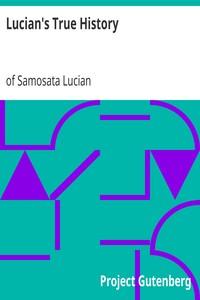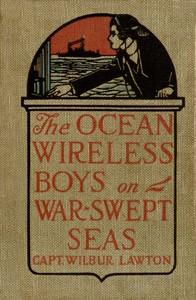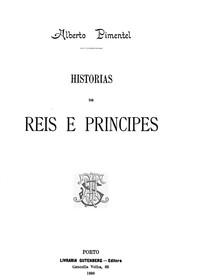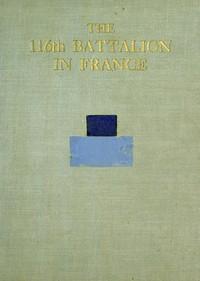|
|
Read this ebook for free! No credit card needed, absolutely nothing to pay.Words: 20380 in 4 pages
This is an ebook sharing website. You can read the uploaded ebooks for free here. No credit cards needed, nothing to pay. If you want to own a digital copy of the ebook, or want to read offline with your favorite ebook-reader, then you can choose to buy and download the ebook.

: Lucian's True History by Lucian Of Samosata Whibley Charles Author Of Introduction Etc Beardsley Aubrey Illustrator Clark Joseph Benwell Illustrator Strang William Illustrator Hickes Francis Translator - Voyages Imaginary Early works to 1800; Satire Greek@FreeBooksWed 07 Jun, 2023 ?? ??????? ???? ????? ????????? ??? ????????, ???????? ?? ???????? ???????? ????? ?? ??? ????????? ??? ?? ???????? ??? ???? ??? ????? ???????, ?? ??? ?? ??? ?????? ??????, ????? ?? ??? ??? ??? ?????? ??? ?? ?????? ??? ??????? ??????????? ??? ?????: "a still and gentle air compassing the whole country." Where will you find a more vivid impression of elegance and serenity? or where match "the melody of the branches, like the sound of wind instruments in a solitary place" ? And when the splendour of the city breaks upon you, with its smaragdus, its cinnamon-tree, its amethyst, ivory, and beryl, the rich barbarity suggests Solomon's Temple, or the City of the Revelation. Its inhabitants are the occasion of infinite jesting, and again and again does Lucian satirize the philosophers, his dearest foes. Socrates was in danger of being thrust forth by Rhadamanthus, ?? ?????? ??? ?? ????? ????? ??? ????????? ??????????, while as for Diogenes the Sinopean, so profoundly was he changed from his old estate, that he had married Lais the Harlot. The journey to Hell is another excuse to gird at the historians. The severest torments were inflicted, says Lucian, upon Ctesias the Cnidian, Herodotus and many others, which the writer beholding "was put in great hopes that I should never have anything to do there, for I do not know that ever I spake any untruth in my life." And yet with all his irony, all his scorn, Lucian has ever a side-glance at literature. The verse of Homer is constantly upon his lips, and it is from Homer that the Gods take their ditties in the Elysian fields. Again, when the traveller visits the city of Nephelococcygia, it is but to think upon the poet Aristophanes, "how wise a man he was, and how true a reporter, and how little cause there is to question his fidelity for what he hath written." He was the son of Richard Hickes, an arras-weaver of Barcheston, in Warwickshire, and after taking the degree of bachelor in the University of Oxford, which he entered in 1579, at the age of thirteen, he was diverted "by a country retirement." Henceforth he devoted his life to husbandry and Greek. Besides Lucian, he translated Thucydides and Herodian, the manuscripts of which are said to survive in the library of Christ Church. Possibly it was his long retirement that gave a turn of pedantry to his mind. It was but natural that in his remote garden he should exaggerate the importance of the knowledge acquired in patient solitude. But certain it is that the notes wherewith he decorated his margins are triumphs of inapposite erudition. When Lucian describes the famous cobwebs, each one of which was as big as an island of the Cyclades, Hickes thinks to throw light upon the text with this astonishing irrelevancy: "They are in the Aegean Sea, in number 13." The foible is harmless, nay pleasant, and consonant with the character of the learned recluse. Thus lived Francis Hickes, silent and unknown, until in 1630 he died at a kinsman's house at Sutton in Gloucestershire. And you regret that his glory was merely posthumous. For, pedant as he was, he made known to his countrymen the enemy of all the pedants, and turned a masterpiece of Greek into English as sound and scholarly as is found in any translator of his time. LUCIAN'S TRUE HISTORY. LUCIAN: HIS TRUE HISTORY. Even as champions and wrestlers and such as practise the strength and agility of body are not only careful to retain a sound constitution of health, and to hold on their ordinary course of exercise, but sometimes also to recreate themselves with seasonable intermission, and esteem it as a main point of their practice; so I think it necessary for scholars and such as addict themselves to the study of learning, after they have travelled long in the perusal of serious authors, to relax a little the intention of their thoughts, that they may be more apt and able to endure a continued course of study. And this kind of repose will be the more conformable, and fit their purpose better, if it be employed in the reading of such works as shall not only yield a bare content by the pleasing and comely composure of them, but shall also give occasion of some learned speculation to the mind, which I suppose I have effected in these books of mine: wherein not only the novelty of the subject, nor the pleasingness of the project, may tickle the reader with delight, nor to hear so many notorious lies delivered persuasively and in the way of truth, but because everything here by me set down doth in a comical fashion glance at some or other of the old poets, historiographers, and philosophers, which in their writings have recorded many monstrous and intolerable untruths, whose names I would have quoted down, but that I knew the reading would bewray them to you. Ctesias, the son of Ctesiochus, the Cnidian, wrote of the region of the Indians and the state of those countries, matters which he neither saw himself, nor ever heard come from the mouth of any man. Iambulus also wrote many strange miracles of the great sea, which all men knew to be lies and fictions, yet so composed that they want not their delight: and many others have made choice of the like argument, of which some have published their own travels and peregrinations, wherein they have described the greatness of beasts, the fierce condition of men, with their strange and uncouth manner of life: but the first father and founder of all this foolery was Homer's Ulysses, who tells a long tale to Alcinous of the servitude of the winds, and of wild men with one eye in their foreheads that fed upon raw flesh, of beasts with many heads, and the transformation of his friends by enchanted potions, all which he made the silly Phaeakes believe for great sooth. This coming to my perusal, I could not condemn ordinary men for lying, when I saw it in request amongst them that would be counted philosophical persons: yet could not but wonder at them, that, writing so manifest lies, they should not think to be taken with the manner; and this made me also ambitious to leave some monument of myself behind me, that I might not be the only man exempted from this liberty of lying: and because I had no matter of verity to employ my pen in , I turned my style to publish untruths, but with an honester mind than others have done: for this one thing I confidently pronounce for a truth, that I lie: and this, I hope, may be an excuse for all the rest, when I confess what I am faulty in: for I write of matters which I neither saw nor suffered, nor heard by report from others, which are in no being, nor possible ever to have a beginning. Let no man therefore in any case give any credit to them. Disanchoring on a time from the pillars of Hercules, the wind fitting me well for my purpose, I thrust into the West Ocean. The occasion that moved me to take such a voyage in hand was only a curiosity of mind, a desire of novelties, and a longing to learn out the bounds of the ocean, and what people inhabit the farther shore: for which purpose I made plentiful provision of victuals and fresh water, got fifty companions of the same humour to associate me in my travels, furnished myself with store of munition, gave a round sum of money to an expert pilot that could direct us in our course, and new rigged and repaired a tall ship strongly to hold a tedious and difficult journey. Thus sailed we forward a day and a night with a prosperous wind, and as long as we had any sight of land, made no great haste on our way; but the next morrow about sun rising the wind blew high and the waves began to swell and a darkness fell upon us, so that we could not see to strike our sails, but gave our ship over to the wind and weather; thus were we tossed in this tempest the space of threescore and nineteen days together. On the fourscorth day the sun upon a sudden brake out, and we descried not far off us an island full of mountains and woods, about the which the seas did not rage so boisterously, for the storm was now reasonably well calmed: there we thrust in and went on shore and cast ourselves upon the ground, and so lay a long time, as utterly tired with our misery at sea: in the end we arose up and divided ourselves: thirty we left to guard our ship: myself and twenty more went to discover the island, and had not gone above three furlongs from the sea through a wood, but we saw a brazen pillar erected, whereupon Greek letters were engraven, though now much worn and hard to be discerned, importing, "Thus far travelled Hercules and Bacchus." There were also near unto the place two portraitures cut out in a rock, the one of the quantity of an acre of ground, the other less, which made me imagine the lesser to be Bacchus and the other Hercules: and giving them due adoration, we proceeded on our journey, and far we had not gone but we came to a river, the stream whereof seemed to run with as rich wine as any is made in Chios, and of a great breadth, in some places able to bear a ship, which made me to give the more credit to the inscription upon the pillar, when I saw such apparent signs of Bacchus's peregrination. We then resolved to travel up the stream to find whence the river had his original, and when we were come to the head, no spring at all appeared, but mighty great vine-trees of infinite number, which from their roots distilled pure wine which made the river run so abundantly: the stream was also well stored with fish, of which we took a few, in taste and colour much resembling wine, but as many as ate of them fell drunk upon it; for when they were opened and cut up, we found them to be full of lees: afterwards we mixed some fresh water fish with them, which allayed the strong taste of the wine. We then crossed the stream where we found it passable, and came among a world of vines of incredible number, which towards the earth had firm stocks and of a good growth; but the tops of them were women, from the hip upwards, having all their proportion perfect and complete; as painters picture out Daphne, who was turned into a tree when she was overtaken by Apollo; at their fingers' ends sprung out branches full of grapes, and the hair of their heads was nothing else but winding wires and leaves, and clusters of grapes. When we were come to them, they saluted us and joined hands with us, and spake unto us some in the Lydian and some in the Indian language, but most of them in Greek: they also kissed us with their mouths, but he that was so kissed fell drunk, and was not his own man a good while after: they could not abide to have any fruit pulled from them, but would roar and cry out pitifully if any man offered it. Some of them desired to have carnal mixture with us, and two of our company were so bold as to entertain their offer, and could never afterwards be loosed from them, but were knit fast together at their nether parts, from whence they grew together and took root together, and their fingers began to spring out with branches and crooked wires as if they were ready to bring out fruit: whereupon we forsook them and fled to our ships, and told the company at our coming what had betide unto us, how our fellows were entangled, and of their copulation with the vines. Then we took certain of our vessels and filled them, some with water and some with wine out of the river, and lodged for that night near the shore. Free books android app tbrJar TBR JAR Read Free books online gutenberg More posts by @FreeBooks
: The Ocean Wireless Boys on War Swept Seas by Goldfrap John Henry Scott A O Arthur O Illustrator - World War 1914-1918 Juvenile fiction; Telegraph Wireless Juvenile fiction@FreeBooksWed 07 Jun, 2023

: Historias de Reis e Principes by Pimentel Alberto - Portuguese fiction 19th century@FreeBooksWed 07 Jun, 2023
|
Terms of Use Stock Market News! © gutenberg.org.in2025 All Rights reserved.






